
The European Free Trade Association (EFTA) is a regional trade organization and free trade area consisting of four European states: Iceland, Liechtenstein, Norway and Switzerland. The organization operates in parallel with the European Union (EU), and all four member states participate in the European single market and are part of the Schengen Area. They are not, however, party to the European Union Customs Union.
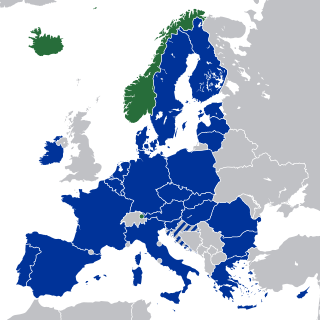
The European Economic Area (EEA) was established via the Agreement on the European Economic Area, an international agreement which enables the extension of the European Union's single market to member states of the European Free Trade Association (EFTA). The EEA links the EU member states and three of the four EFTA states into an internal market governed by the same basic rules. These rules aim to enable free movement of persons, goods, services, and capital within the European single market, including the freedom to choose residence in any country within this area. The EEA was established on 1 January 1994 upon entry into force of the EEA Agreement. The contracting parties are the EU, its member states, and Iceland, Liechtenstein, and Norway. New members of EFTA would not automatically become party to the EEA Agreement, as each EFTA State decides on its own whether it applies to be party to the EEA Agreement or not. According to Article 128 of the EEA Agreement, "any European State becoming a member of the Community shall, and the Swiss Confederation or any European State becoming a member of EFTA may, apply to become a party to this Agreement. It shall address its application to the EEA Council." EFTA does not envisage political integration. It does not issue legislation, nor does it establish a customs union. Schengen is not a part of the EEA Agreement. However, all of the four EFTA States participate in Schengen and Dublin through bilateral agreements. They all apply the provisions of the relevant Acquis.

Iceland is heavily integrated into the European Union via the Agreement on the European Economic Area and the Schengen Agreement, despite its status as a non-EU member state. Iceland applied for membership in 2009. The Minister for Foreign Affairs sent a letter in 2015 that ended the application process.

This is a list of referendums related to the European Union, or referendums related to the European Communities, which were predecessors of the European Union. Since 1972, a total of 48 referendums have been held by EU member states, candidate states, and their territories, with several additional referendums held in countries outside the EU. The referendums have been held most commonly on the subject of whether to become a member of European Union as part of the accession process, although the EU does not require any candidate country to hold a referendum to approve membership or as part of treaty ratification. Other EU-related referendums have been held on the adoption of the euro and on participation in other EU-related policies.
Same-sex marriage has been legal in Switzerland since 1 July 2022. Legislation to open marriage to same-sex couples passed the Swiss Parliament in December 2020. The law was challenged in a referendum on 26 September 2021 by opponents of same-sex marriage and was approved with the support of 64% of voters and a majority in all 26 cantons. The law went into force on 1 July 2022. A provision of the law permitting same-sex marriages performed abroad to be recognised in Switzerland took effect on 1 January 2022. Switzerland was the seventeenth country in Europe and the 30th in the world to allow same-sex couples to marry.
Same-sex marriage will soon be legal in Liechtenstein. In November 2022, the Landtag passed a motion calling on the government to introduce a bill legalizing same-sex marriage, with broad support from across the political spectrum. A bill legalizing same-sex marriage was introduced in February 2024 and passed its final reading in the Landtag on 16 May 2024 by a 24–1 vote. It received royal assent from Prince Alois on 9 July 2024, and is scheduled to enter into force on 1 January 2025. Polling suggests that a majority of Liechtensteiners support the legal recognition of same-sex marriage.
Lithuania does not recognise same-sex marriages or civil unions. A bill to legalise civil unions and grant same-sex couples some legal rights and benefits is pending in the Seimas. Lithuania is the only Baltic state to not recognise same-sex couples in any form. Additionally, the Constitution of Lithuania explicitly prohibits the recognition of same-sex marriages.
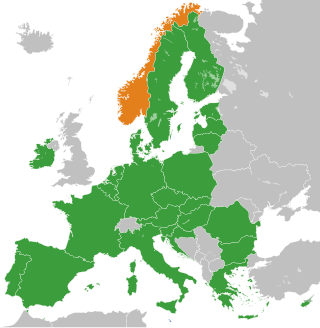
Norway is not a member state of the European Union (EU). However, it is associated with the Union through its membership in the European Economic Area (EEA), signed in 1992 and established in 1994. Norway was a founding member of the European Free Trade Association (EFTA) in 1960, which was originally set up as an alternative to the European Economic Community (EEC), the main predecessor of the EU. Norway had considered joining both the EEC and the European Union, but opted to decline following referendums in 1972 and 1994. According to the European Social Survey conducted in 2018, 73.6% of Norwegians would vote 'No' in a referendum to join the European Union. Norway shares land borders with two EU member states, namely Finland and Sweden, and maritime borders with a third, Denmark.

The most recent enlargement of the European Union saw Croatia become the European Union's 28th member state on 1 July 2013. The country applied for EU membership in 2003, and the European Commission recommended making it an official candidate in early 2004. Candidate country status was granted to Croatia by the European Council in mid-2004. The entry negotiations, while originally set for March 2005, began in October that year together with the screening process.

Switzerland is not a member state of the European Union (EU). It is associated with the Union through a series of bilateral treaties in which Switzerland has adopted various provisions of European Union law in order to participate in the Union's single market, without joining as a member state. Among Switzerland's neighbouring countries, all but one are EU member states.
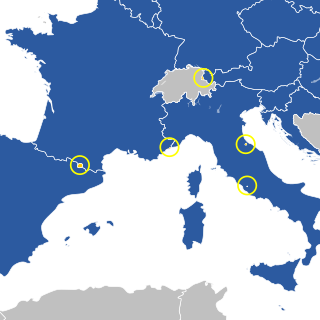
Currently, all of the European microstates have some form of relations with the European Union (EU).

In general, the law of the European Union is valid in all of the twenty-seven European Union member states. However, occasionally member states negotiate certain opt-outs from legislation or treaties of the European Union, meaning they do not have to participate in certain policy areas. Currently, three states have such opt-outs: Denmark, Ireland and Poland. The United Kingdom had four opt-outs before leaving the Union.

A referendum on European Union membership was held in Malta on 8 March 2003. The result was 54% in favour. The subsequent April 2003 general elections were won by the Nationalist Party, which was in favour of EU membership, the opposition Labour Party having opposed joining. Malta joined the EU on 1 May 2004.
Eight referendums were held in Switzerland during 2009. The first was held on 8 February on extending the freedom of movement for workers from Bulgaria and Romania. The next two were held on 17 May 2009 on introducing biometric passports and the "Future with complementary medicine" proposal. A further two were held on 27 September on increasing VAT and the introduction of public initiatives. The final three were held on 29 November on banning the construction of new minarets, exporting weapons and the use of aviation fuel taxation.
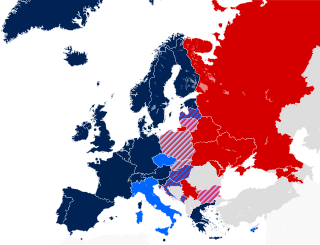
Debate has occurred throughout Europe over proposals to legalise same-sex marriage as well as same-sex civil unions. Currently 33 of the 50 countries and the 8 dependent territories in Europe recognise some type of same-sex union, among them most members of the European Union (24/27). Nearly 43% of the European population lives in jurisdictions where same-sex marriage is legal.
Slovakia does not recognise same-sex marriage or civil unions. However, there is some limited legal recognition for unregistered cohabiting same-sex couples, notably with regard to inheritance rights. The Constitution of Slovakia has limited marriage to opposite-sex couples since 2014, and bills to allow same-sex civil partnerships have been introduced several times, most recently in 2023, but all have been rejected.
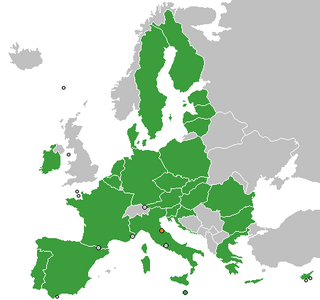
Relations between the Republic of San Marino and the European Union (EU) began in February 1983. San Marino is completely surrounded by one EU member state, Italy.
A referendum is a direct vote in which an entire electorate is asked to either accept or reject a particular proposal. This article summarises referendum laws and practice in various countries.
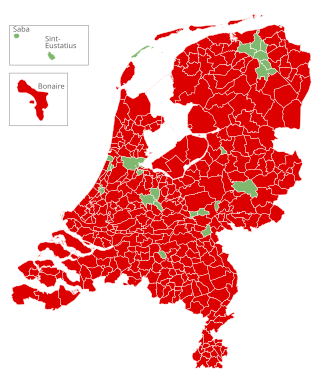
An advisory referendum on the approval of the Ukraine–European Union Association Agreement was held in the Netherlands on 6 April 2016. The referendum question was: "Are you for or against the Approval Act of the Association Agreement between the European Union and Ukraine?"
Several federal referendums were held in Switzerland in 2020, with voting on 9 February, 27 September and 29 November. Voting was also planned for 17 May, but was postponed due to the COVID-19 pandemic.














